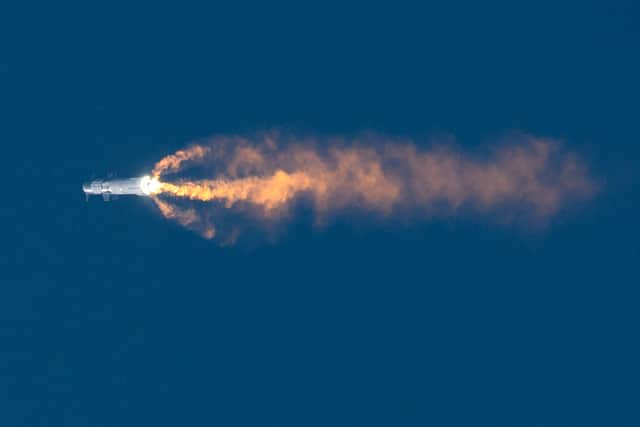SpaceX Starship: Why did Elon Musk’s world’s biggest rocket explode and why was it a success?
and live on Freeview channel 276
Elon Musk’s SpaceX company has successfully launched the world’s biggest rocket ship during a landmark test. Starship - the biggest and most powerful rocket ever created - launched from Boca Chica in Texas on Thursday (April 20) morning after being delayed on Monday (April 17).
The launch was initially delayed after a stuck valve saw the rocket miss its initial launch window on Monday. But Starship did launch on Thursday morning with thousands of spectators watching nearby.
Advertisement
Hide AdAdvertisement
Hide AdDespite Starship exploding just minutes into the launch, SpaceX has branded the test flight as a success, with plans to launch a second test flight in just months. Founder and CEO Elon Musk has congratulated the team on an “exciting test launch”.
The rocket had initially exceeded expectations from SpaceX and Elon Musk, who hoped to launch the rocket without destroying the launch pad infrastructure. Musk had previously said that Starship not prematurely exploding would be considered “a win”.
SpaceX had planned to send the rocket on one near-complete revolution of Earth before bringing Starship down into the Pacific Ocean near Hawaii. Future plans for the rocket include potential flights to the Moon and Mars.
What happened during the Starship launch?
Elon Musk and SpaceX had their wishes granted as Starship successfully launched without destroying the launch pad. However, just minutes into the flight, Starship’s system failed to separate which sent the ship spiralling out of control.
Advertisement
Hide AdAdvertisement
Hide AdSix of the 33 onboard engines at the base of Starship had been shut off or flamed out, which was quickly followed by two halves of the vehicle staying connected, causing Starship to begin spinning in the sky. The spacecraft manufacturer said on Twitter that the flight had experienced "rapid, unscheduled disassembly before stage separation", which caused the rocket to begin losing altitude.
SpaceX then decided to destroy the world’s largest rocket with onboard charges just four minutes into its first test flight. No-one was hurt during the test flight that saw Starship uncrewed as it launched from the Texas shoreline.


Why is SpaceX branding the Starship launch a success?
SpaceX and Elon Musk have declared the launch of Starship as a success despite causing the vehicle to explode. Musk had previously attempted to lower expectations sharing the rocket had a 50% chance of reaching orbit during the flight.
However, the business tycoon has since shared that with more launches planned in the coming months that there is an 80% chance of success before the end of the year. Musk took to his social media platform Twitter to share that SpaceX: “Learned a lot for next test launch in a few months” after sitting with the team during the launch.
Advertisement
Hide AdAdvertisement
Hide AdThe team at SpaceX could be heard cheering as Starship exploded, after successfully being able to demonstrate they could terminate a flight if something went wrong. SpaceX has since released a statement that said: “With a test like this, success comes from what we learn, and we learned a tremendous amount about the vehicle and ground systems today that will help us improve on future flights of Starship.”
How powerful is the Starship rocket?
Starship has been fitted with a booster, named Super Heavy, which was tested whilst clamped to its launch mount back in February. At the time the cluster of engines were throttled back to just half of their capacity.
SpaceX promised they would use a 90% thrust during the Thursday launch, which should have delivered power close to 70 meganewtons. The thrust power of the Super Heavy booster delivers double the thrust put out by the Saturn V rocket that previously took men to the Moon in the 1960s and 70s.
Despite Starship not exploding prematurely and destroying its launch pad, pictures following the launch indicate the power from the boosters had done a large amount of damage to concrete surfaces.
